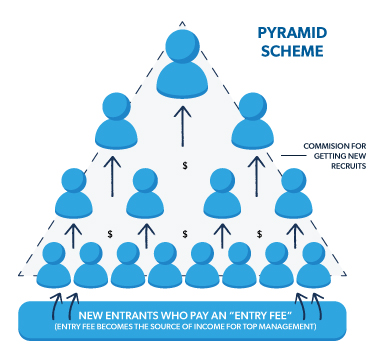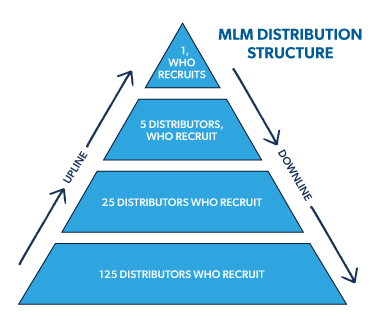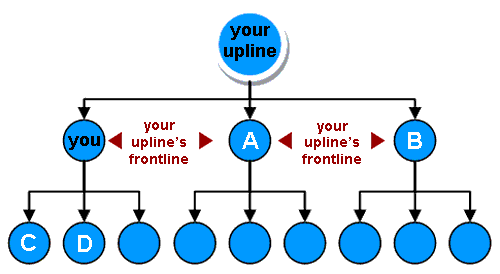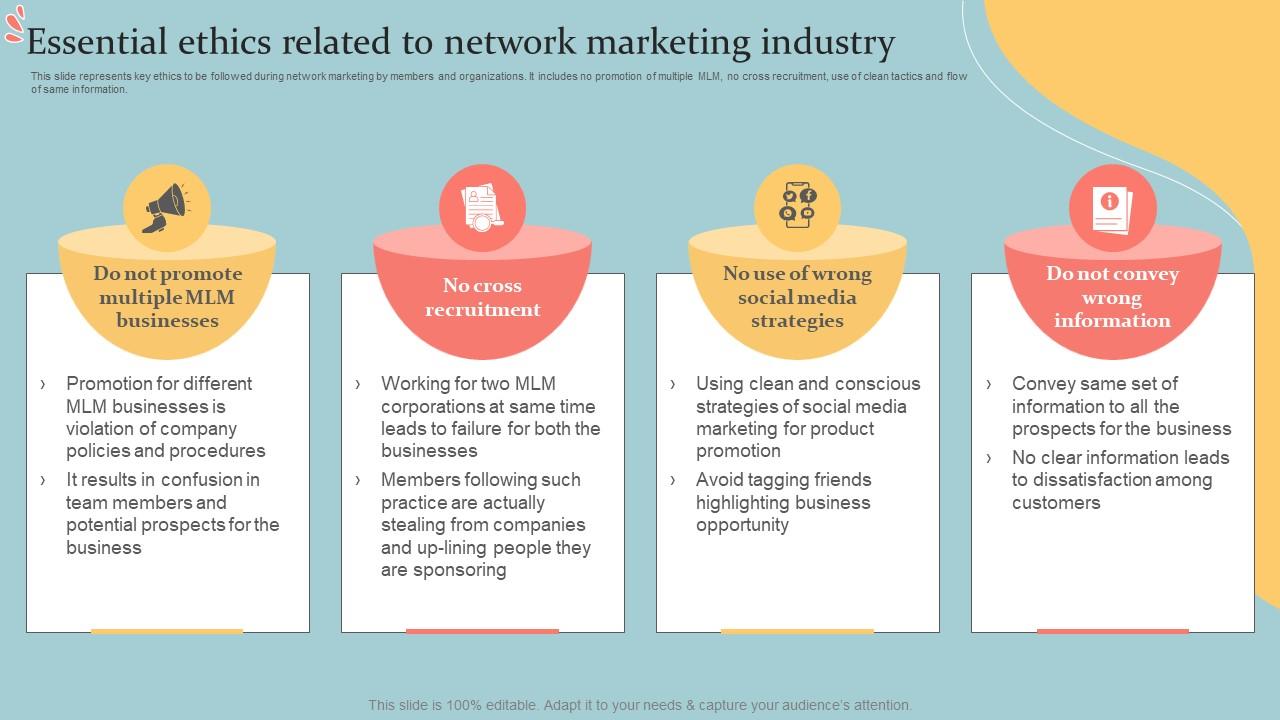
Introduction
Multi-Level Marketing (MLM) is a marketing strategy that utilizes a network of independent distributors to sell products and services. This marketing technique is also known as network marketing or referral marketing. MLM businesses rely on their distributors to promote and sell their products directly to the consumers, earning commissions from each sale they make.
Explanation of MLM
In an MLM structure, a company recruits distributors to sell its products or services. These distributors are responsible for building their network of distributors by recruiting, training, and motivating others to join the business. The more people they recruit, the higher their earnings potential.
MLM companies typically offer bonuses and incentives to motivate distributors to sell more products and build their network. These bonuses can come in the form of cash, trips, or other rewards. MLM companies often claim that their business model is an opportunity for anyone to create a successful business through hard work and dedication.
The importance of understanding MLM structure
Understanding the MLM structure is vital, whether an individual is considering joining an MLM company or just curious about how these businesses operate. One reason for this is that MLMs have been associated with fraudulent schemes in the past. By understanding how MLMs work, individuals can better assess whether a particular MLM company is legitimate or not.
Another reason why it is crucial to understand the MLM structure is that it can affect an individual's success in the business. MLMs are designed to reward distributors who can expand their network. Individuals who fail to recruit or build their network may have difficulty making significant earnings.
In conclusion, MLMs are a popular marketing strategy that has been around for a long time. Understanding how MLMs work is critical to determine whether a particular MLM company is legitimate or not. Moreover, understanding the MLM structure can help individuals assess their potential success in the business.

Company Structure
Multi-Level Marketing (MLM) is a marketing strategy that uses independent distributors to sell products and services. MLM companies rely on their distributors to promote and sell their products directly to consumers and earn commissions for each sale. MLMs offer bonuses and incentives to motivate distributors to sell more products and build their network.
The role of the parent company
In an MLM structure, a parent company recruits distributors and provides them with training, marketing materials, and support. The parent company is responsible for the products or services offered, and the subsidiaries operate under its name. The parent company offers compensation plans, and the subsidiaries follow them.
The subsidiary companies and their hierarchy
Subsidiaries are the companies that operate under the parent company. MLM subsidiaries differ from traditional subsidiaries as they are run by independent distributors and not managed directly by the parent company. The subsidiaries recruit new distributors who operate under their name and expand the network. The subsidiaries offer compensation plans to their distributors, which are linked to their performance in selling the parent company's products.
Understanding the MLM structure is crucial as it can affect an individual's success in the business. MLMs are designed to reward distributors who can expand their network. Individuals who fail to recruit or build their network may have difficulty making significant earnings. MLMs have been associated with fraudulent schemes in the past, so understanding how MLMs work can better assess whether a particular MLM company is legitimate or not.
In conclusion, MLMs are a prevalent marketing strategy that requires understanding for individuals to assess their potential success and determine whether an MLM company is legitimate or not. MLMs rely on their distributors to sell products and expand networks. The parent company offers support, and the subsidiaries operate under it while recruiting and managing their network of distributors.

Up-line and Down-line
The concept of Up-line and Down-line
Multi-Level Marketing (MLM) companies operate based on the principle of up-line and down-line. The up-line refers to the distributors or sponsors who recruited an individual, while the down-line refers to the individual's sponsored distributors. The concept of up-line and down-line is important in MLM as it determines the structure of the network and the flow of commissions.
When an individual joins an MLM company, they become a part of their sponsor's down-line. If the individual recruits new distributors, they become part of the individual's down-line. This creates a hierarchical structure where distributors can earn commissions from their down-line's sales, and up-line distributors can earn commissions from their down-line's sales.
The benefits of having a strong up-line
Having a strong up-line can significantly impact an individual's success in MLM. A strong up-line can provide support, guidance, and training, which can help new distributors build their network and make significant earnings. Up-line distributors can also provide assistance in recruiting new distributors and expanding their network, which can increase the individual's down-line and earnings potential.
Strong up-lines can also provide access to exclusive tools, resources, and training programs offered by the parent company. This can help distributors stay up-to-date on the latest products and marketing strategies, which can help them sell more products and gain a competitive edge.
In conclusion, MLM companies operate based on the principle of up-line and down-line, where the up-line refers to the distributor or sponsor who recruited an individual, while the down-line refers to the individual's sponsored distributors. Having a strong up-line can significantly impact an individual's success in MLM by providing support, guidance, and training, assisting in recruitment, and providing access to exclusive tools and resources.

Compensation Plans
Overview of Compensation Plans
Multi-Level Marketing (MLM) companies use various compensation plans to provide incentives to their distributors and motivate them to generate sales. Compensation plans determine the payout structure and commission rates for distributors based on their sales performance. In general, compensation plans can be classified into two categories: breakaway plans and unilevel plans.
Different Types of Compensation Plans and Their Structures
Breakaway plans usually have multiple levels of payouts, based on a distributor's sales performance. Once a distributor reaches a certain sales volume, they can "breakaway" from their up-line and become a leader in their own right. This typically results in higher commission rates and more autonomy for the distributor. However, breakaway plans can be more challenging to navigate and require a more significant investment in time and resources to be successful.
On the other hand, unilevel plans are generally simpler and more straightforward. In this type of plan, distributors earn commissions on their personal sales as well as on their down-line's sales. There are usually no limits on the number of levels a distributor can earn commissions from, and the commission rates are typically lower than those offered in breakaway plans.
Some other common compensation plans used by MLM companies include matrix plans, binary plans, and hybrid plans, which combine elements of both unilevel and breakaway plans. Matrix plans operate based on a fixed matrix or grid, where distributors earn commissions based on the number of distributors they recruit and the volume of sales made by their down-line. Binary plans are similar to matrix plans, but usually pay commissions only on the volume of sales made by a distributor's two strongest legs. Hybrid plans combine elements of both breakaway and unilevel plans, providing greater flexibility for distributors to build their network and earn commissions based on their unique sales performance.
In conclusion, compensation plans play a critical role in the success of an MLM business. By offering incentives and commissions to distributors, these plans help motivate and reward distributors for their continued efforts to generate sales and build their network. Understanding the different types of compensation plans and their structures is essential for anyone looking to succeed in the MLM industry.
:max_bytes(150000):strip_icc()/MLM-TAERM-ADD-SOURCE-16091bd51da945f28fbd9522f5a173d6.jpg)
Distributors
Roles and Responsibilities of Distributors
Multi-Level Marketing (MLM) companies rely on their distributors to generate sales and build their network. Distributors play a critical role in the MLM business model and are responsible for several tasks, including:
- Identifying potential customers and recruiting new distributors to the network
- Conducting product demonstrations and presentations to showcase the company's products and services
- Providing training and support to new distributors to help them succeed
- Building a robust network of distributors and customers to increase sales and revenue
- Maintaining positive relationships with customers and providing excellent customer service
The Importance of Having Motivated Distributors
Having motivated and dedicated distributors is essential for the success of any MLM business. Motivated distributors are more likely to generate sales, recruit new members, and build a loyal customer base. They are also more likely to invest time and resources into the business, which can lead to increased revenue and growth for the company.
To keep their distributors motivated, MLM companies use various strategies, including offering incentives, bonuses, and commissions based on sales performance. By creating a sense of competition and providing rewards for success, MLM companies can inspire their distributors to work harder and achieve greater results.
In addition to financial rewards, MLM companies also provide training and support to their distributors to help them improve their skills and knowledge. This can include online training programs, mentorship programs, and coaching sessions with experienced distributors. By investing in the development of their distributors, MLM companies can ensure they have the skills and motivation needed to succeed in the competitive MLM industry.
In conclusion, successful MLM companies rely on their distributors to generate sales and build their network. By understanding the roles and responsibilities of distributors and providing them with the support and training they need, MLM companies can create a motivated and dedicated team of distributors and achieve long-term success.

Products
Overview of product-based MLM
In a product-based MLM structure, companies rely on their distributors to promote and sell their products to a wide network of customers. These products can range from health supplements and beauty products to household items and technology gadgets. The MLM business model encourages distributors to not only sell products but also recruit new members to the network, creating a sustainable business opportunity for everyone involved.
The role of products in a MLM structure
Products are the backbone of any MLM business, as they provide the revenue and profit necessary for the company to grow and sustain its operations. Products in a MLM structure must not only be of high quality and affordable but also unique and exclusive to guarantee a competitive edge in the market.
Distributors play a crucial role in promoting and selling these products, showcasing their features and benefits to potential customers through demonstrations and presentations. Additionally, distributors can provide customer service and support to ensure customer satisfaction, which can lead to repeat business and increased sales.
MLM companies recognize the importance of having a strong product line, offering regular updates and improvements to their product catalog to stay relevant in a constantly evolving market. By providing their distributors with quality and exclusive products, MLM companies can create a strong incentive for their distributors to continue promoting and selling their products.
In conclusion, products are essential to the success of MLM businesses, providing the revenue and profit necessary to sustain their operations. Distributors play a key role in promoting and selling these products, while MLM companies continually invest in product development to provide a competitive edge in the market.
:max_bytes(150000):strip_icc()/MLM-TAERM-ADD-SOURCE-16091bd51da945f28fbd9522f5a173d6.jpg)
Products
Overview of product-based MLM
Product-based MLM companies rely on their distributed salesforce to promote and sell their products to a wide range of customers. These products can be anything from health supplements and beauty products to household items and technology gadgets. The MLM business model encourages distributors not only to sell products but also to recruit new members to the network, creating a sustainable business opportunity for everyone involved.
The role of products in a MLM structure
Products are the backbone of any MLM business as they provide the revenue and profit necessary for the company to grow and sustain its operations. MLM products must be of high quality, affordable, unique and exclusive to ensure a competitive edge in the market. Distributors play a crucial role in promoting and selling these products by presenting the features and benefits to potential customers through demonstrations and presentations. Additionally, they can provide customer service and support to ensure customer satisfaction, leading to repeat business and increased sales.
MLM companies recognize the importance of having a strong product line. They offer regular updates and improvements to their product catalog to stay relevant in a constantly evolving market. Providing their distributors with quality and exclusive products creates an incentive for distributors to continue promoting and selling these products.
Training and Support
The importance of training and support
Training and support are crucial components of any MLM distributor's success. Without proper training and support, the chances of success decrease significantly. MLM companies understand this need and offer extensive training programs to their distributors. These programs equip distributors with the necessary skills and knowledge to succeed in the business, ranging from sales techniques and product features to customer service and team management.
Different types of training available
MLM companies offer a variety of training options for their distributors. Some of the most common types of training include webinars, seminars, and coaching programs. These training programs are designed to address different aspects of the business and cater to different learning styles. MLM companies also have support systems in place, including online forums, mentorship programs, and customer support, to offer assistance to their distributors as needed.
In conclusion, products and training are vital components of a successful MLM business. The right products can make a difference in a distributor's success, and proper training equips distributors with the skills needed to sell those products effectively. Through a combination of quality products and comprehensive training and support, MLM companies can create a sustainable business opportunity for their distributors.

Ethics and Legalities
MLM ethics
Product-based MLM companies should adhere to ethical standards to ensure lasting success and build trust with their clientele. MLM ethics include things like transparency in product claims, adherence to laws and regulations, honesty in business practices, fair and ethical treatment of members, and avoiding deceptive and misleading practices. Companies should not prioritize profit at the expense of ethics and should take responsibility for any ethical violations that occur.
Distributors also have a role to play in upholding MLM ethics. They should ensure that their sales tactics are honest and transparent and avoid making false or misleading claims about products. They should also abide by the company's policies and procedures and promote ethical behavior among their team members.
Legal issues in MLM
Legal issues can arise in MLM companies, especially when it comes to compensation plans and pyramid schemes. Pyramid schemes cause harm to investors as they concentrate their earnings on recruitment more than selling a product or service.
The Federal Trade Commission (FTC) defines pyramid schemes as programs that pay commissions based on member recruitment rather than the sale of products or services. MLMs can avoid being classified as pyramid schemes by ensuring that their commissions are based on actual product sales rather than recruitment.
MLM companies are also required to comply with consumer protection laws and regulations. These laws require companies to disclose all relevant information about their products and business operations, including relevant income disclosures and compensation plans. Companies that don't follow these regulations can face legal action and significant fines.
In conclusion, ethics and legalities are essential factors to consider in product-based MLM companies. By adhering to ethical standards and following regulations, companies can build a sustainable business model that benefits their members and customers alike. Distributors also play a crucial role in ensuring that ethical practices are upheld in MLM businesses.

Ethics and Legalities
MLM ethics
Product-based MLM companies are expected to follow ethical standards. They should prioritize transparency in product claims, remain compliant with laws and regulations, practice honesty in business dealings, provide fair and ethical treatment to members, and avoid deceptive and misleading practices. If a company fails to follow ethical practices, it can lose trust and face long-term losses. MLM members also have a responsibility to promote ethical behavior among their teams and avoid making false or misleading claims.
Legal issues in MLM
Legal issues are not uncommon in MLM companies, particularly with regard to compensation plans and pyramid schemes. In a pyramid scheme, earnings depend more on member recruitment than on product or service sales. The FTC, which defines pyramid schemes as programs that pay commissions based on member recruitment, can detect and punish such unethical practices. An MLM can avoid being categorized as a pyramid scheme by creating commission structures that are based on actual product or service sales. MLM companies must comply with all relevant consumer protection laws and regulations, including disclosures of income, compensation plans, and other relevant information. Companies that violate these rules can face legal action and significant fines.
Conclusion
Advantages and disadvantages of MLM
While MLM provides opportunities for people to earn supplemental income, it also has its fair share of limitations. One of the main advantages of MLM is the potential for unlimited earnings, which is determined by a person’s drive, determination and hard work. In contrast, one of the biggest disadvantages is the high potential for financial loss, especially when members aren't properly trained or lack a thorough understanding of how the business works. Besides, MLM requires a huge amount of time and effort, which can often lead to physical and emotional stress.
Future of MLM structure
The MLM industry is continuously evolving, and changes are expected in the foreseeable future. Many believe that MLM companies will transition from traditional methods of recruitment and sales to online platforms. Such changes could facilitate increased transparency and lead to the development of new products and services, helping to keep pace with the changes in market dynamics. The future of the MLM industry will be determined by the willingness of its members to embrace change and adapt to emerging trends while continuing to maintain ethical principles.
